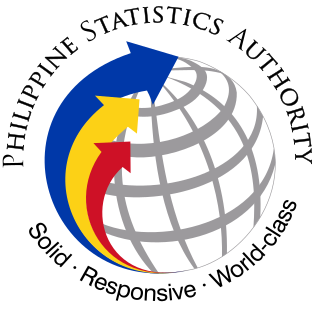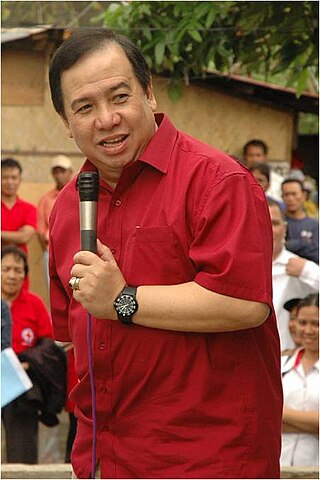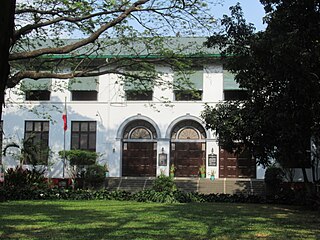
Panfilo "Ping" Morena Lacson Sr. is a Filipino former politician and police general who served as a Senator for three terms: from 2001 to 2013 and from 2016 to 2022. He was the Director General of the Philippine National Police (PNP) from 1999 to 2001, and was a candidate in the 2004 and 2022 Philippine presidential elections.

The Philippine Statistics Authority is the central statistical authority of the Philippine government that collects, compiles, analyzes and publishes statistical information on economic, social, demographic, political affairs and general affairs of the people of the Philippines and enforces the civil registration functions in the country.

Vicente Castelo Sotto III, professionally known as Tito Sotto, is a Filipino politician, entertainer and athlete who served as Senate President from 2018 to 2022. Before that, he had two stints each as Senate Majority Leader and Senate Minority Leader. He served a total of four terms in the Senate: 1992 to 2004 and 2010 to 2022, tying the record for the longest-serving Senator with Lorenzo Tañada and Franklin Drilon. In between his stints in the Senate, he led the Dangerous Drugs Board for a year. He became the Vice Mayor of Quezon City from 1988 to 1992, and later unsuccessfully ran for vice president in the 2022 elections as Panfilo Lacson's running mate.

Richard Juico Gordon is a Filipino lawyer and politician who most recently served as a Senator from 2016 to 2022, and previously from 2004 to 2010. He is the chairman and CEO of the Philippine Red Cross since 2004.

Alan Peter Schramm Cayetano is a Filipino lawyer and diplomat serving as a Senator since 2022 and previously from 2007 to 2017. He was the Senate Minority Leader from 2010 to 2013, and later Senate Majority Leader from 2013 to 2016. He also served as the Representative of Taguig–Pateros from 1998 to 2007 and from 2019 to 2022 and was the Speaker of the House of Representatives from 2019 until his resignation in 2020. He also served as the Secretary of Foreign Affairs from 2017 to 2018 in the cabinet of President Rodrigo Duterte, after unsuccessfully running for vice president in the 2016 elections as Duterte's running mate.

Filipino Sign Language (FSL) or Philippine Sign Language, is a sign language originating in the Philippines. Like other sign languages, FSL is a unique language with its own grammar, syntax and morphology; it is neither based on nor resembles Filipino or English. Some researchers consider the indigenous signs of FSL to be at risk of being lost due to the increasing influence of American Sign Language.

Ana Theresia Navarro Hontiveros-Baraquel is a Filipino politician, community leader, and journalist serving as a Senator since 2016. She previously served as a party-list representative for Akbayan from 2004 to 2010.
The national symbols of the Philippines consist of symbols that represent Philippine traditions and ideals and convey the principles of sovereignty and national solidarity of the Filipino people. Some of these symbols namely the national flag, the Great Seal, the coat of arms and the national motto are stated in the Flag and Heraldic Code of the Philippines, which is also known as Republic Act 8491. In the Constitution of the Philippines, the Filipino language is stated as the national language of the Philippines. Aside from those stated symbols in the Constitution and in Republic Act 8491, there are only six official national symbols of the Philippines enacted through law, namely sampaguita as national flower, narra as national tree, the Philippine eagle as national bird, Philippine pearl as national gem, arnis as national martial art and sport and the Filipino Sign Language as the national sign language. Thus, there is a total of twelve official national symbols passed through Philippine laws.

Sherwin Ting Gatchalian, known as Win Gatchalian, is a Filipino politician and businessman serving as a Senator since 2016. A member of the Nationalist People's Coalition (NPC), he previously served as the Representative of Valenzuela's 1st district from 2001 to 2004 and from 2013 to 2016. He was the Mayor of Valenzuela from 2004 to 2013.

The Philippine Space Agency (PhilSA) is the national space agency of the Philippines.

The Bangsamoro Organic Law, also known as the Bangsamoro Basic Law (BBL), and officially designated as Republic Act No. 11054, is a Philippine law that provided for the establishment of the Bangsamoro Autonomous Region in Muslim Mindanao (BARMM).

The 17th Congress of the Philippines, composed of the Philippine Senate and House of Representatives, met from July 25, 2016, until June 4, 2019, during the first three years of Rodrigo Duterte's presidency. The convening of the 17th Congress followed the 2016 general elections, which replaced half of the Senate membership and the entire membership of the House of Representatives.

The Philippine Identification System ID, also known as the Philippine Identification Card or simply the national ID, is the official national identity card for Filipino citizens worldwide and foreign permanent residents in the Philippines. The document is a significant part of the Philippine Identification System (PhilSys), the national identification system to be implemented by the Philippine government.

The 2019 Philippine general election was conducted on May 13, 2019. A midterm election, those elected therein will take office on June 30, 2019, midway through the term of President Rodrigo Duterte.

The Department of Human Settlements and Urban Development, abbreviated as DHSUD, is the executive department of the Philippine government responsible for the management of housing and related development in the Philippines. The department is led by the Secretary of Human Settlements and Urban Development, as appointed by the President of the Philippines and confirmed by the Commission on Appointments. The secretary would be assisted by three Undersecretaries and three Assistant Secretaries, that would be appointed by the President upon the recommendation of the Secretary.

Claire Dennis S. Mapa is a Filipino economist and statistician. He is the National Statistician and Civil Registrar General (NSCRG) of the Philippine Statistics Authority with a rank of Undersecretary as appointed by President Rodrigo Duterte. He succeeds Lisa Grace Bersales whose tenure ended on 22 April 2019.

The 2022 Philippine general election took place on May 9, 2022, for the executive and legislative branches of government at every level – national, provincial, and local – except for the barangay officials.

The Bayanihan to Heal as One Act, also known as the Bayanihan Act, and officially designated as Republic Act No. 11469, is a law in the Philippines that was enacted in March 2020 granting the President additional authority to combat the COVID-19 pandemic in the Philippines. The word "bayanihan" is a Tagalog word for communal work.

The SIM Registration Act, officially designated as Republic Act No. 11934 and commonly referred to as the SIM card law, is a Philippine law mandating the registration of SIM cards before activation. Under the measure, mobile device users, must register their SIM cards, whether prepaid or postpaid. The law was enacted intending to curb cybercriminal activities. The law also aims to address issues related to trolling, hate speech, and online disinformation.


















